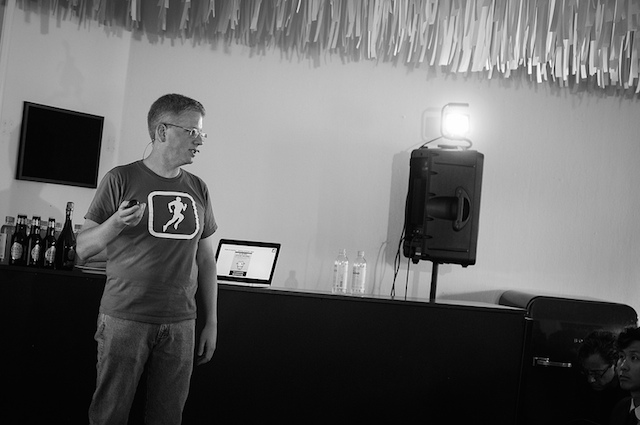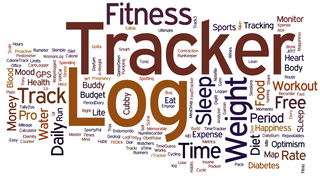”Even relatively mundane everyday objects like bath mats will be sensing and logging data about you in the future”.
Bill Day is the platform evangelist at Boston based start-up RunKeeper. He travels the world helping developers learn to use Health Graph, RunKeepers open API, when building health and fitness applications.
Lifelogging in health and fitness
When it comes to digitalising your life the health and fitness domain seems to be a natural first step. Lifelogging bracelets and sensors are becoming more popular and today a lot of people wear them like accessories. At the same time running is more popular than ever with almost 15 million people participating in a road race in the US during 2011. These two trends fit RunKeeper perfectly. Using the GPS sensor in your smart phone they have found a way for you to measure and log your workouts. You can keep track of time and distance as well as other health related factors, like how many calories you burn, just by using your phone.
In June 2011 Runkeeper opened up their API and they soon realised that they needed someone who could take good care of the community of developers that worked with it and the apps they developed.
Bill Day started later that fall and today there are more than 80 apps built on the Health Graph API. He is one of the most informed about what happens around digital health and fitness. With this in mind we decided to talk to Bill Day about RunKeeper, lifelogging and what health related digital trends he sees in the future.
Interview with Bill Day from RunKeeper
How does Runkeeper relate to lifelogging?
RunKeeper turns your smart phone into a personal trainer in your pocket. We enable you to log and track your fitness. We also opened up our Health Graph platform a year ago to integrate with other apps and devices across a broad range of health and fitness categories.
Why should someone use Runkeeper to keep track of life?
We now have more than 80 publicly launched Health Graph partners. You can see and connect to all the apps at the RunKeeper website. In addition to our own RunKeeper app’s running, walking, cycling, and other activity tracking capabilities, our partners give you access to WiFi body scales, pedometers, heart rate monitors, strength training apps, diet and weight loss apps, corporate wellness platforms, fitness games, and more.
You should use RunKeeper and our partners so that you can record, share, and understand all of the health related aspects of your life in one cohesive, easy to system.
What digital trends do you see when it comes to lifelogging?
Sensors will continue to get smaller and cheaper. You will wear them embedded in your clothing and jewellery, use them when you drive your car or ride your bike, interact with them all day long as you move through your home and work environments. Even relatively mundane everyday objects like bath mats will be sensing and logging data about you (see the Podimetrics discussion here).
As ever more data is generated about you, platforms for collecting, collating, and making sense of all that data will become more and more crucial. And that’s why we’re so very excited about the opportunity for our partners and us working together on the Health Graph.
Creative uses of digital services
At the end of August RunKeeper partnered with GymPact who charges you every time you miss out on a planned work out. There are also RunKeeper apps where you can challenge your friends to work out more. If you want to keep track of how many miles your running shoes have run there’s an app for that too.
The creative uses of the HealthGraph API are many and we look forward to even more health and fitness apps in the future. Until then, make sure to read our summary of the lifelogging start-ups in the health and fitness domain.




594 Comments
If you’d like to try out a service that is using Health Graph I’d recommend ShapeUpClub. Not only are they one of the original health track apps (tracing back to 2008!) but also very nice tenants of Memoto in Stockholm. 🙂
When someone writes an post he/she keeps the plan of a user in his/her mind that how a user can be aware of it.
Therefore that’s why this paragraph is great. Thanks!
I like reading a post that will make men and women think.
Also, thank you for permitting me to comment!
Hi there everyone, it’s my first pay a visit at this site, and piece of writing is really fruitful in support of me, keep up posting such articles.
Hey there, You’ve done an excellent job. I will certainly digg it and personally recommend to my friends. I’m confident they’ll be benefited from this website.
If you desire to improve your knowledge just keep visiting this web page and be updated with the latest
news posted here.
Link exchange is nothing else except it is simply placing the other person’s webpage link on your page at proper place and other person will also do same in favor of you.